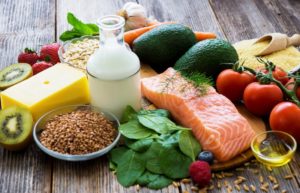 This March is National Nutrition Health Month in Greensboro, which means medical professionals all over the area are doing their part to educate patients on how they can improve their overall health through a better diet! While this is a great time for general practitioners, it’s also a great opportunity for dentists. This is because not only are oral health and overall health connected, but so is diet. With the right balanced diet, you can do just as much for your oral health as your at-home brushing and flossing!
This March is National Nutrition Health Month in Greensboro, which means medical professionals all over the area are doing their part to educate patients on how they can improve their overall health through a better diet! While this is a great time for general practitioners, it’s also a great opportunity for dentists. This is because not only are oral health and overall health connected, but so is diet. With the right balanced diet, you can do just as much for your oral health as your at-home brushing and flossing!
Why Diet Matters to Oral Health
At the end of the day, you’re only practicing your oral care routine a handful of times daily. In between your brushing and flossing, you’re eating many different foods, all of which transform the overall pH balance inside your mouth. Bacteria thrive in a mouth that is highly acidic and are able to grow and develop the fastest when this is the case.
If your mouth is constantly acidic because you’re eating many foods that promote this acidity, you put yourself at much higher risk of developing cavities. This is why dentists often tell patients to brush and floss following a meal. Furthermore, certain foods can stay in the mouth and on teeth longer, and many of these foods contain large amounts of starch and sugar. These two ingredients are some of the worst offenders for oral health, and we’ll explain why now.
Avoid Foods Containing Starch and Sugar
Whether it’s a bag of potato chips, a candy bar, or a carbonated cola, foods and beverages that contain large amounts of starch or sugar can be detrimental to your oral health. This is because bacteria loves to consume starch and sugar on a regular basis. If your mouth is constantly covered in these ingredients, your oral care routine might not stop a cavity from developing. For this reason, maintaining a balanced diet is more important than ever!
Foods to avoid and limit include:
- Potato chips
- Candy bars
- Gummy, chewy or sour candies
- Dried fruits
- Carbonated drinks (especially dark colas)
- Bread
- Alcohol
- Ice cubes (which are hard enough to crack a tooth!)
Choose Foods Rich in Calcium, Phosphorus and Vitamin C
While most people know that teeth need calcium to remain healthy and strong, they need other vitamins and minerals as well. Furthermore, your gums need attention too as they give your teeth a place to live! When choosing foods good for oral health, focus on options containing calcium, phosphorus, and Vitamin C. These foods can be found below.
Calcium
- Low-fat or fat-free milk
- Yogurt
- Cheese
- Fortified soy drinks and tofu
- Canned salmon
- Almonds
- Dark leafy greens
Phosphorus
- Eggs
- Fish
- Lean meats (pork and chicken)
- Dairy
- Nuts
- Beans
Vitamin C
- Citrus fruits (in moderation)
- Tomatoes
- Peppers
- Broccoli
- Potatoes (instead of chips of course!)
- Spinach
Want more diet tips from a dentist? Schedule an appointment and they’ll give you more lessons on protecting your oral health in Greensboro!
About the Author
Dr. David Fisher understands the unique relationship that oral health has with overall health and always takes whole-body wellness into account when building treatment plans for his patients. Whether it’s through improved diet, oral hygiene at home, or professional exams and cleanings at his office, he takes preventive care very seriously and looks forward to helping patients of all ages achieve a healthier lifestyle through diet and dentistry. To learn more about his practice, you can contact him through his website.

